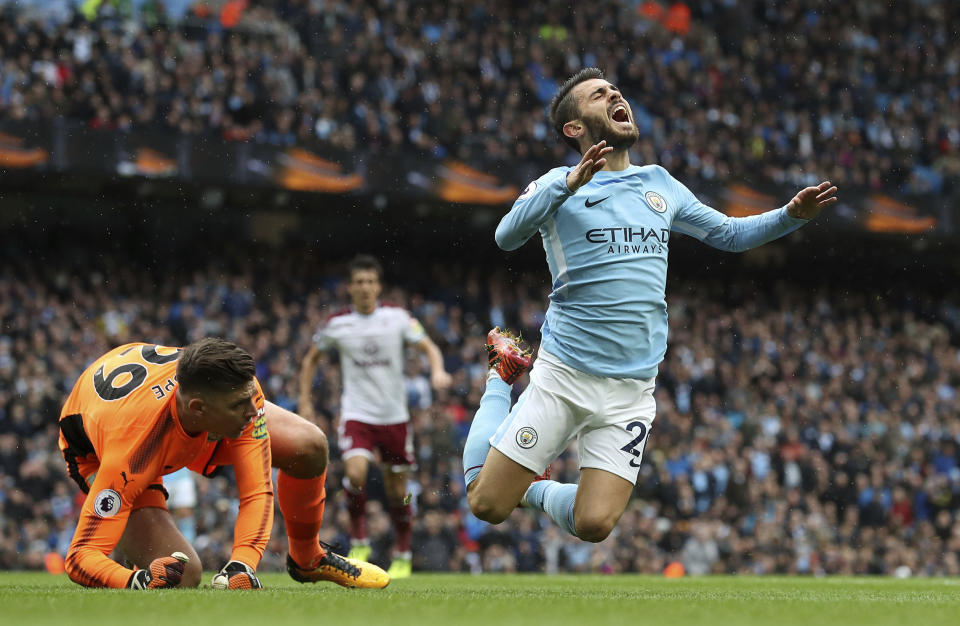Bernardo Silva and the big diving debate: How 'cheating' became an art form

It was difficult to determine whether Sean Dyche was impressed or disgusted by Bernardo Silva’s conduct in winning a penalty for Manchester City against Burnley on Saturday. “For him to get that high off the floor when your hands are above your head is a skill in itself,” he smirked with more than a hint of passive aggression. “If I kicked my kid in the garden he wouldn’t fall like that.”
Indeed, there was more than a hint of exaggeration about Silva’s efforts to win a penalty, making the most of the challenge from Nick Pope to hit the deck. It was only one the second or third viewing of the replay that the true nature of the Portuguese playmaker’s simulation became apparent. That, as Dyche said, took skill.
That’s the thing about diving. There’s an art to it. It’s not easy to pull off a convincing dive, such is the number of officials positioned around the average football pitch in 2017. There are few sympathisers, with calls for a crackdown on divers repeated every few months as a matter of course, but is there nobody out there who can appreciate the art form it has become?
READ MORE: Ronaldo says Messi rivalry is just starting
READ MORE: FIFPro World XI revealed
READ MORE: Giggs eyes Everton and Leicester jobs
The predominant stigma around diving is not one of deception or cheating, but of masculinity. Gary Lineker once put forward the idea that players who go down too easily should be shown “pink cards,” as if to somehow suggest manliness is determined by who can stay on their feet the longest.
Of course, diving is frequently derided as a foreign thing. In fact, that’s something that was once claimed word for word by Alan Stubbs, reflecting a common sentiment across the sport. “It’s crept into our game lately, but it’s a foreign thing,” the former Everton defender said. “They speak good English, it’s not as if they don’t understand what they’re doing.”
Even when homegrown players are accused of diving, the blame is somehow directed back at the foreigners who have somehow infiltrated English football culture with their deception and impure intentions. It’s not too dissimilar from the sort of rhetoric that resulted in 52% of the British population voting for Brexit.
They vilify divers in other countries too, particularly in the US where ‘flopping’ as it’s called is seen as one of the factors preventing football from becoming a truly mainstream sport. Just as is the case in the United Kingdom, the rejection of diving is rooted in the notion that men should act like men, also reflected in the response to the epidemic of concussion in the NFL.
Interesting that Bernardo Silva got the cheating foreigner treatment today. Replays showed keeper challenge buckled his ankle. Obvious pen
— Oliver Holt (@OllieHolt22) October 21, 2017
READ MORE: Tottenham are the team Mourinho wants United to be
READ MORE: Gossip – Managers queuing up for the Everton job
READ MORE: Ronaldo beats Messi to top award
There are places in the world, however, where the art form is appreciated. In Brazil, for instance, diving is viewed as an act of rebellion rather than a sign of cowardice as it is on these shores. Football fans in the land of the sport’s most artful hail divers for their ability to fool authoritative figures, partly due to the number of native ancestors who have suffered at the hands of a ruthless, capitalist society over generations.
There are so such socio-economic factors like that at play when it comes to the British attitude towards simulation, but there is more than one way to look at the act of diving. Dyche might not have liked the way Silva went to ground on Saturday, but his reaction was perhaps the right one.
There was a certain derision to the tone of his remarks, but an underlying appreciation too. He’s right that his kid wouldn’t fall like Silva in the garden because his kid likely wouldn’t possess such a skill. All this doesn’t mean you have to like diving, stand up and applaud it whenever your team is made to pay for it, but the art form is there. That much is undeniable.

 Yahoo Sport
Yahoo Sport 






































